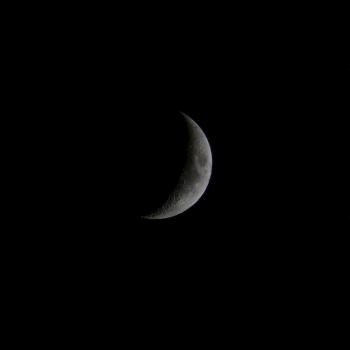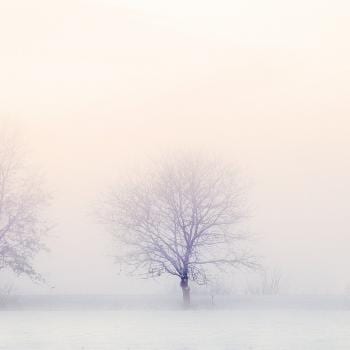For this series, we will be focusing on the path of laity and what it means to be a lay-person in the Otherfaith. This is the most accessible path and the one we should all start from when beginning to interact with the gods and spirits of this faith.
The three most important parts of the Otherfaith are establishing right relationship, prayer, and maintaining a shrine. When we begin our work, we start with the first two (right relationship and prayer) and only bring in shrines and material offerings after we have established those. You may have noticed that I haven’t included lists of offerings or any altar layouts, and this is because we have to begin with our actions and behavior first.
Right Relationship – Contemplation
While the Otherfaith is definitely a faith of action, an incredibly important part of our practice is contemplative. Only through reflection and contemplation can we decide if we are behaving appropriately, living in a way that honors the gods, or if we need to change. Contemplation is how we learn to act more in line with the gods and spirits in our daily lives.
In living in tune with the Four Gods, we need to begin stripping away shame. Shame has an important role in our faith, both symbolically in the mythos and in our daily lives. Shame keeps us from behaving in inappropriate ways (though that phrase itself could mean many different things depending on ones’ ethical system) and it can also stifle us to the point of breaking. For the Other People, contemplation helps us differentiate between necessary shame – when we have acted against our ethics and need to make amends – and unhealthy shame – that which stems from self-hate or taught patterns of internalized hatred.
We don’t want to cultivate shame. It strangles us and keeps us from moving forward in our lives and living in tune with the gods, which is why most of the cleansing prayers and rituals in the Otherfaith focus on identifying and washing away shame. One of the goals of the Other People is to be proud, to lift our heads up. Shame brings us low.
Contemplation is the act of taking a moment of our time to think. We stop moving for a second and question. To give an example of what contemplation looks like, I’ll offer up questions I often ask myself:
- How do I feel about my actions?
- What in my life can I improve?
- Did I violate any laws or taboos that my gods have given me?
- Did I behave in a respectful way to others around me?
- Did my actions make my uncomfortable or ashamed? Why?
Each question, as we consider it, should lead to more questions. We have to take the time to reflect on ourselves.
As I mentioned in my last post, the ethics of the Other People are not virtue ethics. Perhaps as we reflect on ourselves, we look into the mirror and see a ‘monster’ (whether that image is a monster by society’s standards or a monster by our own). the Dierne specifically is a patron and protector of such monsters, and of the mirrors we contain within ourselves that show us our truest selves – but he is also the patron of masks and lies. What matters more to the Other People is acting and behaving in an honorable way, not cutting out all the ‘impure’ or ‘impious’ thoughts we contain.
While action is the more important aspect in the Otherfaith, reflection and thought is necessary to know if we are behaving appropriately. Though I’ve cultivated my practice so that I always check-in throughout the day, I also take a moment each week to sit down in front of my shrine and think in the presence of the gods. I reach out to the Dierne, to help with self-acceptance, and the Clarene, to help with figuring out solid actions to take or change.
the Dierne is all about pride, which is part of why I call to him during my formal contemplative practice. He can help identify where we’ve stumbled and help us understand the root of our shame. He’s the antithesis of shame, and in the mythos he helps people speak out and work through shame. He does this by holding up a mirror for us to gaze into, so that we can take stock of what needs to change. And he does this also by teaching us how to accept the parts of us that are frightening or strange to the rest of the world. With him present, we can identify where our shame stems from.
the Clarene, as I mentioned in her post, gives us dignity. Being in right relationship with her means that we don’t strip someone of their dignity, that we don’t hurt people just to see them cry. If we have behaved in an unethical way, the Clarene helps guide us to making amends and changing our behavior. She can shove us out of our contemplation and into action, which is what contemplation must turn into. Reflecting on our actions is great, but unless we’re acting on that understanding we’re not really making progress. Once we’ve sat with the Dierne and identified what needs to change, the Clarene can help us figure out how.
These two parts of right relationship – action and contemplation – feed into each other constantly. We’re not living in right relationship with the gods and spirits if we’re lacking one. Without self-reflection we can easily slip into unethical behavior or start focusing more on our egos than on the gods. Without action we’re not actually living our faith, we’re just talking pretty ideas.
And part of right relationship is offering prayer to the gods, which I’ll be discussing next.
Links to Relevant Posts
Basics: Daily Action
Four Gods of the Otherfaith
the Clarene
the Ophelia
the Laetha
the Dierne
















